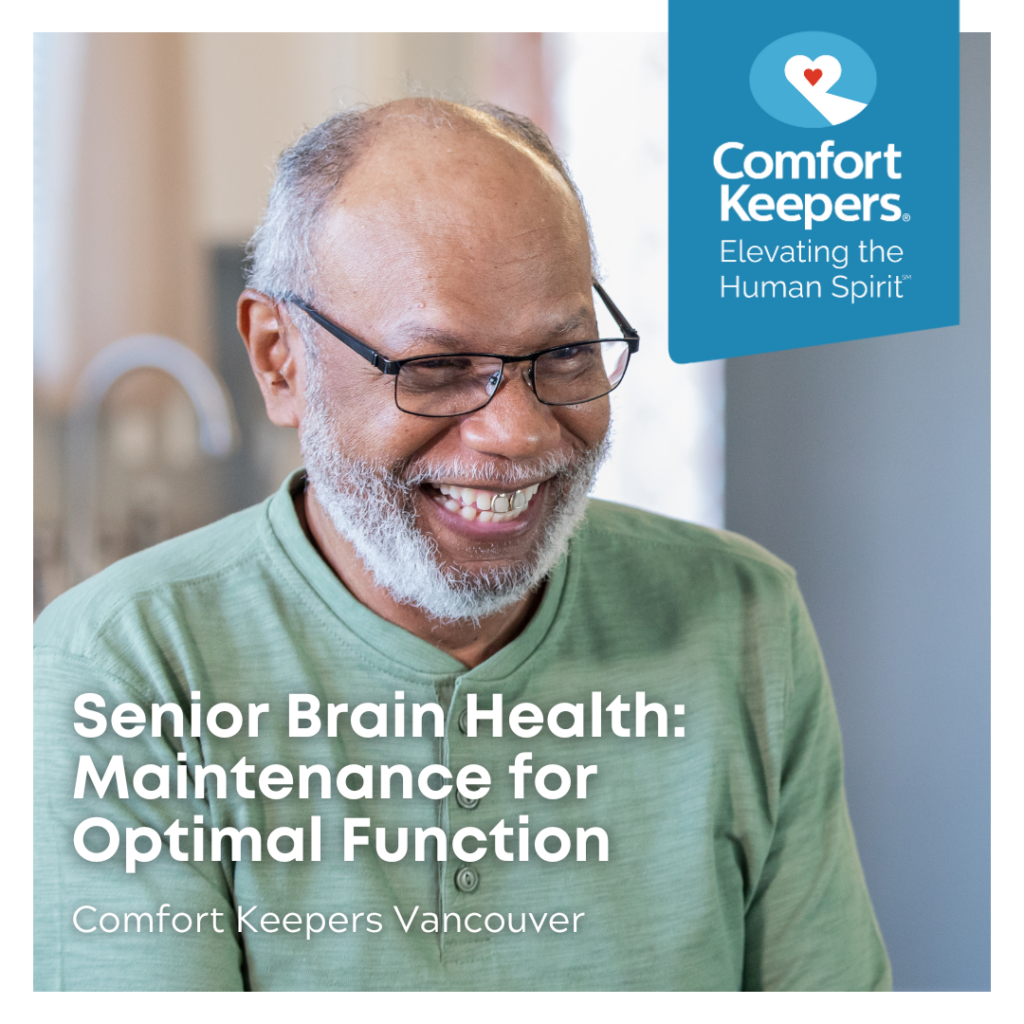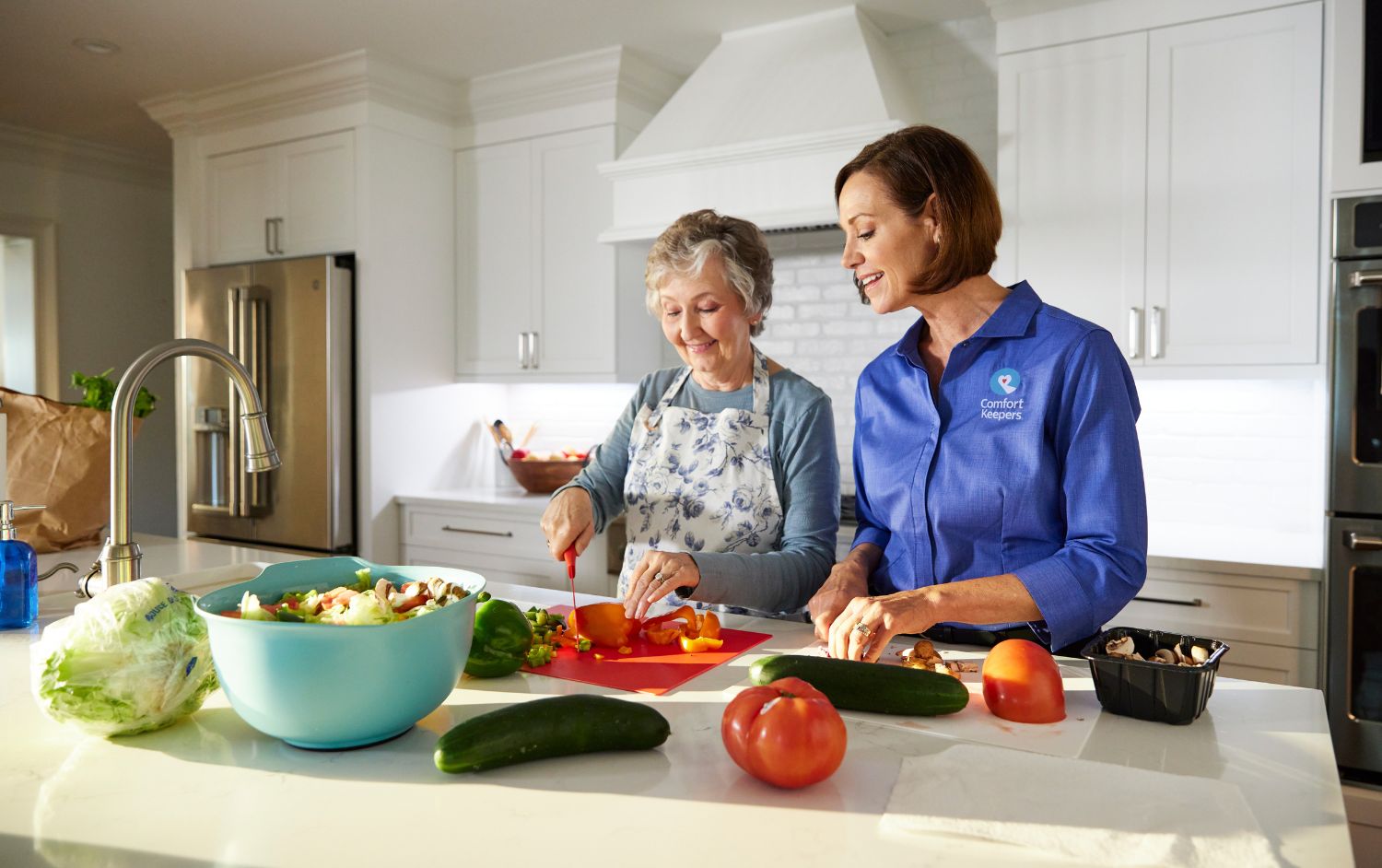Senior Brain Health: Maintenance for Optimal Function
Seniors and Alzheimers | September 24, 2024

What Every Senior in Vancouver, BC, Needs to Know About Keeping Their Brain Function Healthy
What do you need to know about senior brain health? As scientists delve deeper into understanding the brain, each breakthrough seems to spark new, unexpected questions. While this drives research to become more specialized, it also highlights the brain’s immense and seemingly limitless complexity.
Senior Brain Health FAST FACT: Although the human brain represents only two percent of the body’s weight, it receives nearly a quarter of its total blood supply.
Despite all of its mysteries, one thing we do know is that the brain – like all of our organs – does indeed age. As we get older, the brain’s overall volume gradually decreases. At approximately 5% per decade after the age of 40, this decrease causes nerve cells to lose certain connections. Reduction in blood flow and certain cardiovascular conditions can also add to this.
For seniors, these factors may lead to occasional forgetfulness or lapses in memory. Significant memory loss is not a normal part of aging and may indicate Alzheimer’s disease or Dementia. Seniors who experience memory loss or have problems with language skills, perception, or other mental functions. In that case, you must address these concerns with a physician.
Senior Brain Health: Four Ways to Maintain Optimal Function
Research has indicated that there are several ways that older adults (and those of all ages) can help reduce the risk of cognitive decline – many of which are beneficial for other aspects of the body. Encourage your aging loved ones to incorporate the following best practices into their lifestyle. Be sure that, before beginning any new exercise regimen or diet, your loved ones consult with a physician and dietician.
#1. Stimulation:
In the last few years, there have been numerous research studies in the area of neurological plasticity, which refers to the brain’s ability to structurally modify in response to new experiences. This “re-wiring” of nerve cells is actually what is at the center of most cognitive and physical rehabilitation practices.
However, it essentially serves the same function for those looking to keep their brains healthy, and it can be done simply by learning new skills or keeping the brain regularly “exercised” through puzzles or games.
Many suggest that seniors enroll in a class or other form of organized learning – which will help not only in developing new skills but also in cultivating socialization.
#2. Exercise Regularly:
While it’s not exactly news that exercise is good for the body, it may come as a surprise to some that regular exercise also has quite an impact on mental health. Physical activity improves cardiovascular health, which in turn helps supply the brain with blood.
It also helps in developing new/increasing existing neural connections (see neurological plasticity above), allowing the brain to be more adaptive. Research suggests that regular exercise can also significantly reduce mental stress.
Some seniors may choose to join a class with close friends for exercise, but it can just as easily be done at home. The key is to ensure that the heart rate is elevated through moderate activity, for at least 20-30 minutes every day.
#3. Watch Your Diet:
The food we consume has a direct effect on our mental wellbeing and health. To operate at its optimum level, the brain requires fuel in the form of vitamins, minerals, and other essential nutrients.
If your current diet consists primarily of salt, sugar, fat, and refined/processed foods, consider switching things around. Studies show that diets consisting of fruits, vegetables, whole grains, sources of B vitamins, and lean meats can significantly reduce anxiety levels and even the risk of depression.
#4. Stay Social:
Although it’s not entirely understood how socialization bolsters brain health, studies show that a correlation between having strong social connections and longer life expectancy does exist. Interaction, whether it be with friends, family members, or next-door neighbours, appears to reduce the risk of cognitive decline and improve overall mental well-being.
This is especially evident in those who volunteer their time to help others. Try reaching out through organizations, community centers, or schools to see how you can help make a positive impact on others – and the health of your brain.
Senior Brain Health Best Practice: Engagement
What unifies all of these best practices for maintaining brain health? The key, as countless scientific studies would suggest, is engagement. In this case, it means getting out and meeting new people versus staying inside and watching TV, choosing to find healthy alternatives to cheap fast food, and finding ways to help not only yourself but those in your community as well.
Comfort Keepers® Can Help
If your loved ones are working to improve their mental well-being and want to incorporate the aforementioned best practices into their lifestyle, we can help.
The Best Senior Home Care Provider in Vancouver, BC, is Comfort Keepers®
Many families prefer Comfort Keepers® when arranging senior home care services for a loved one in or around Vancouver, British Columbia.
If you are concerned about the health and well-being of your aging loved ones, we can help with 24-hour care. Comfort Keepers Vancouver also provides home care services like respite care, overnight care, Alzheimer’s disease and dementia care, personal care, and more!
Comfort Keepers® Vancouver Can Help with Companion Care and Interactive Caregiving™
Personal and empathetic care starts in the heart and allows us to meet our clients’ needs. Comfort Keeper’s philosophy is to elevate the human spirit, and our caregivers ensure your loved one experiences a better quality of life.
Trained caregivers help provide our senior clients with personal home care to help maintain the highest possible quality of life, keeping them happy and healthy at home. Our Interactive Caregiving™ delivers a system of care that addresses safety, nutrition, mind, body, and activities of daily living (ADLs).
Bring The Best Home Care Assistance for Seniors Right Where You Live with Comfort Keepers®
Comfort Keepers® Vancouver is proud to provide elder care in homes throughout Vancouver, keeping seniors safe in their homes. We provide home care for the seniors of Vancouver and the surrounding areas of Burnaby, Langley, Maple Ridge, and Richmond. Please call (604) 689-8609.
Personal Care and Senior Homecare in Vancouver, BC
Learn more about our unique service, which offers personal care, companionship care, palliative care, and end-of-life care by contacting the Comfort Keepers® Vancouver office.
Accredited and Quality Respite Care Available 24/7 for British Columbia Families
Accreditation Canada has awarded Comfort Keepers® Vancouver with Exemplary Standing. This designation is only achieved after an organization’s policies, procedures, and processes undergo a thorough evaluation by industry experts to ensure they meet or exceed the stringent quality standards set by Accreditation Canada for Home Care companies.
References:
- Harvard Health Publications. “12 Ways to Keep Your Brain Young.” Web. 2006.
- Everyday Health. “How to Stay Sharp As You Age” by Krisha McCoy. Web. 2017.
- Brain Facts. “What We Know – and Don’t Know – About Aging.” Web. 2012.
- National Institute on Aging. “The Aging Brain.” Web. 2017.
Individualized Home Care Options
Long-Term Home Care, 24 Hour Home Care & Short Term Care Options Customized for You







